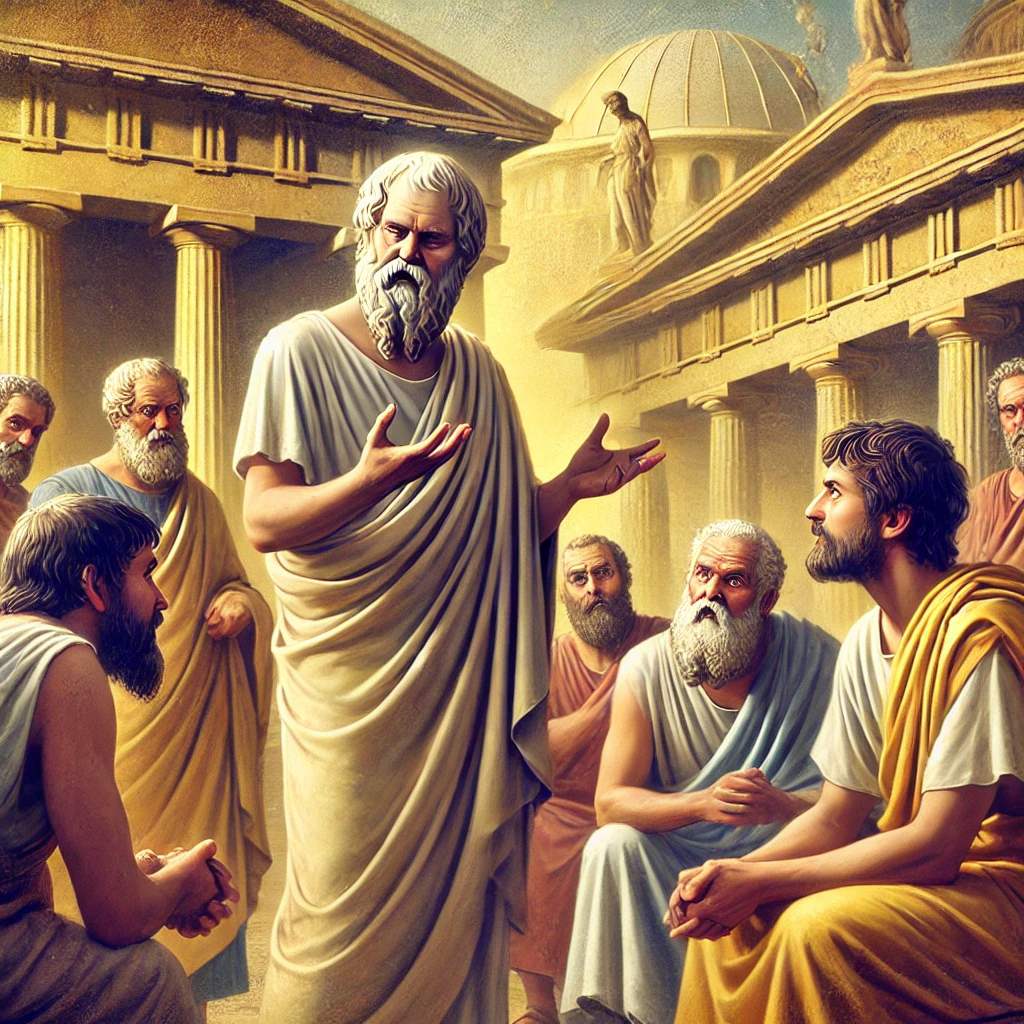Socrates was a philosopher who lived in ancient Athens during the 5th century BCE. He didn’t write down any of his teachings, yet his ideas shaped Western philosophy. His influence comes through his students, mainly Plato, who recorded his dialogues. Despite his impact, Socrates remains an enigma—both revered and misunderstood.
Early Life: A Mystery Wrapped in a Question
We know surprisingly little about Socrates’ early years. He was born around 470 BCE in Athens to a stonemason and a midwife. Some sources say he followed in his father’s craft before turning to philosophy. Others suggest he was always more interested in people than in chiseling stone.
Unlike the aristocrats of Athens, Socrates came from a humble background. He never pursued wealth or power, which set him apart from other thinkers. His main interest was in understanding human nature and the pursuit of wisdom. That obsession would define his entire life.
The Unconventional Philosopher
Socrates didn’t lecture in classrooms or write treatises. Instead, he wandered Athens, engaging people in conversation. He would question merchants, politicians, and citizens, challenging their beliefs. His goal wasn’t to teach but to make people think deeply.
This approach made him both famous and notorious. People admired his intellect but also found him irritating. He exposed ignorance in high places, making powerful enemies. Over time, his relentless questioning became a political problem.
The Socratic Method: Teaching by Asking
Socrates’ greatest contribution to philosophy is the Socratic Method. It’s a technique that involves asking a series of questions to uncover contradictions in a person’s thinking. The goal is not to provide answers but to refine understanding. It’s still used today in law schools and philosophical debates.
This method forced people to confront their own ignorance. Many found it uncomfortable, but it was undeniably effective. Socrates believed true wisdom came from recognizing one’s own lack of knowledge. The more you know, the more you realize how little you understand.
Socrates vs. The Sophists
Socrates’ approach differed from the Sophists, a group of traveling teachers. The Sophists charged fees for their lessons, often teaching rhetoric and persuasion. They prioritized winning arguments over discovering truth. Socrates, by contrast, sought wisdom for its own sake.
He accused the Sophists of corrupting the youth by teaching them to argue dishonestly. They, in turn, saw Socrates as a troublemaker. His insistence on questioning everything made him unpopular in certain circles. He wasn’t just a philosopher—he was a disruptor.
The Oracle of Delphi and the “Wisest Man”
A pivotal moment in Socrates’ life came when the Oracle of Delphi declared him the wisest man in Athens. Socrates was baffled. He didn’t consider himself wise at all. But he set out to test the Oracle’s statement.
He questioned poets, politicians, and craftsmen, expecting to find someone wiser. Instead, he discovered that those who claimed wisdom often knew the least. This led him to a paradoxical conclusion: he was wise only because he knew he was ignorant.
The Trial of Socrates
By 399 BCE, Socrates had made too many enemies. Athens had recently suffered a devastating war, and the city was in turmoil. Socrates’ relentless questioning made him a convenient scapegoat. He was charged with corrupting the youth and impiety (disrespecting the gods).
His trial was a spectacle. Instead of defending himself with flattery or appeals to emotion, he doubled down. He argued that Athens needed him, like a gadfly stinging a lazy horse. His defiance sealed his fate.
The Death Sentence
The jury found Socrates guilty by a narrow vote. He was given the chance to propose an alternative punishment. Some expected him to suggest exile. Instead, he sarcastically suggested that Athens should reward him with free meals for life.
Unsurprisingly, this didn’t help his case. The court sentenced him to death by drinking hemlock, a poisonous liquid. His final days were spent in philosophical discussion with his followers.
Socrates’ Final Moments
Socrates didn’t fear death. He believed in the immortality of the soul and saw death as a transition. His last recorded conversation, in Plato’s Phaedo, explored what happens after we die. Even in his final moments, he remained committed to philosophy.
When the time came, he drank the hemlock calmly. His friends wept, but he reassured them. He reminded them that a true philosopher should not fear the unknown. With that, he lay down and died.
The Legacy of Socrates
Though Socrates left no writings, his students carried his ideas forward. Plato, his most famous pupil, wrote dialogues featuring Socrates as the central figure. Through Plato, Socrates’ ideas influenced Aristotle, shaping the foundation of Western thought.
His emphasis on questioning, self-examination, and ethics continues to impact philosophy, law, and education. His legacy is a reminder that wisdom comes not from having answers but from asking the right questions. Socrates may have died, but his influence is immortal.
Why Socrates Still Matters Today
In a world drowning in information, Socrates’ lessons are more relevant than ever. He taught us to think critically and challenge assumptions. He warned against blindly following authority. His life is a testament to the power of independent thought.
More than 2,000 years later, the Socratic Method is still used in education, law, and public discourse. His philosophy encourages us to engage with ideas rather than accept them at face value. In an age of misinformation, Socrates’ lessons remain invaluable.
Conclusion
Socrates was not just a philosopher; he was a force of nature. He questioned everything, even at the cost of his own life. His teachings remain a cornerstone of philosophy, shaping how we seek truth. His story reminds us that the pursuit of wisdom is worth any price.
Stay curious.




